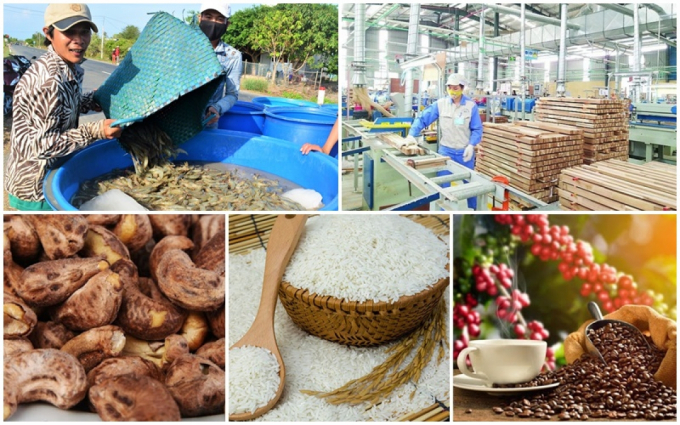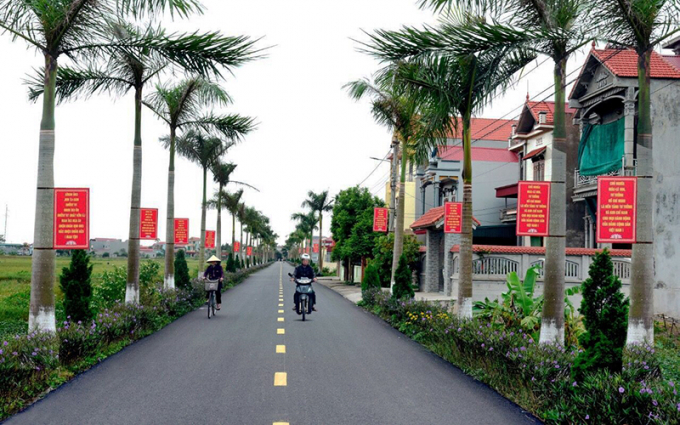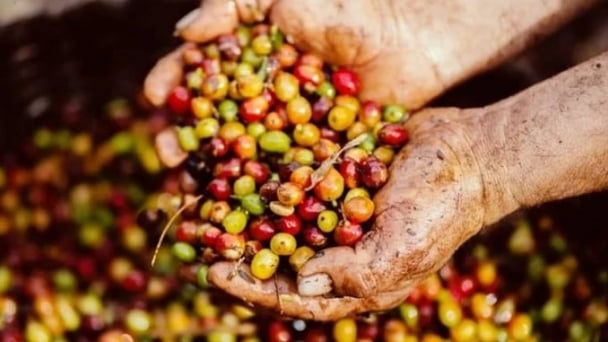June 17, 2025 | 14:15 GMT +7
June 17, 2025 | 14:15 GMT +7
Hotline: 0913.378.918
June 17, 2025 | 14:15 GMT +7
Hotline: 0913.378.918

Total export turnover of Vietnamese agricultural products in 2020 reached a record of $41.53.
Despite many difficulties caused by droughts, natural disasters, epidemics, market fluctuations, and the great impacts of the COVID-19 pandemic in recent years, Vietnam's agriculture has played a significant role in economic development and social stability, especially in difficult periods of the national economy.
Agriculture has always performed well in its core part of ensuring national food security, sustainable poverty reduction, and providing inputs and resources for industrialization. Agricultural growth reached 2.6%/year in the period 2010 - 2020. In 2020, the per capita rice output reached 438.2kg.
Over six million tons of rice are exported annually, accounting for 12% of the world's rice exports. The export of agricultural products is constantly increasing, making Vietnam one of the agricultural product powerhouses. The export turnover of agricultural products in the period 2010 - 2020 increased by 8.7%/year on average and the agricultural trade surplus has always been positive, reaching 8.69 billion/year on average.
The total export turnover of agricultural products in 2020 reached a record of $41.53 despite the outbreak of the COVID-19 pandemic worldwide and was expected to reach over $48 billion in 2021. Vietnam has 10 groups of agricultural products with an export turnover of 1 billion USD and over, of which 5 products are over 3 billion USD. The export market for agricultural products is constantly expanding and the quality of exported goods has been improved.
Vietnam's countryside has prospered, the infrastructure has improved, the rural economy has developed and the quality of life of rural residents has been bettered. Rural economic development with the following rapid transformations: the production organization has been restructured in the direction of prioritizing the development of production forms and scales with high productivity, quality, efficiency, and commodity value; the number of enterprises and the number of cooperatives has increased rapidly.
Per capita income/year in rural areas increases faster than that of urban residents, from VND12.8 million in 2010 to VND43 million /person in 2020; the rate of multidimensionally poor households in rural areas has decreased rapidly, on average by about 1.5%/year and by the end of 2020 to 5.6%. The landscaped environment is improving as more and more beautiful and clean villages have been built.
The New Rural Program has achieved many important achievements and mobilized the participation of the entire population to jointly build a more sustainable rural development, increasingly improve people's lives, and build strong rural communities.

The rural Vietnam has become prosperous in recent years.
However, the development of agriculture in rural areas still reveals many shortcomings and limitations. Agricultural growth is slowing down and unsustainable, mainly based on intensive resource exploitation. Many production inputs depend on the import market. Preservation and processing are underdeveloped, post-harvest losses are still high, production linkages in value chains are limited and the markets are unstable.
The results of new rural construction in some regions are still low compared to the general level of the whole country and there is still a gap in implementation results between regions. The income of farmers and rural people is still relatively low and the disparity in terms of income between regions, rural and urban areas, and among ethnic groups is still high. Farmers' income has not been commensurate with the overall growth of the sector and the growth of export turnover. The rural environment is still polluted and the role of the community has not been properly promoted.
The process of industrialization and urbanization has revealed some limitations and has not supported or compensated for the shortcomings of the agricultural sector. Some localities have prioritized industrial development to boost the economy and ignore the role of agriculture, even in areas with agricultural advantages.
Entering a new phase, the speed of industrialization and urbanization is progressing rapidly. The process of international economic integration is deepening, and the scientific revolution 4.0 is taking place strongly. Natural disasters and epidemics are increasingly complicated, especially climate change is happening fast and seriously affecting production, life, and environment globally. The domestic and international consumer markets are changing dramatically with increasing requirements for quality standards and new requirements for society, community responsibility, environment, in the context that green agricultural trends and green consumption are increasingly popular.
These are major challenges that require both changes and opportunities for the national agricultural sector. It is also necessary to have new views, orientations, and specific actions for agricultural and rural development to restore the growth momentum of the agricultural sector, to exploit new opportunities, and to limit the challenges in obtaining targets of a sustainable and efficient agriculture, a modern and civilized countryside, farmers with stable and higher incomes and provided with new knowledge.
To do that, it is necessary to have a clear view and continue to place agriculture, farmers and rural areas in strategic positions in socio-economic development, industrialization and modernization of the country.
Agriculture is an advantage and a sustainable foundation of the country. The countryside is an important economic development area, the main space associated with natural resources as well as the cultural, social, security and defense foundation of the country. Farmers are an important workforce and human resource in the coming period.
It is therefore important to develop effective and sustainable agriculture in terms of economy - society – environment; bring into play the advantages and efficiency of resources (land, water, air, people, historical and cultural traditions) and science, technology, and innovation. Meanwhile, agricultural production thinking should be shifted to agricultural economic thinking, meaning the production of high-value, diversified products along the value chain and integration between socio-cultural and environmental values into products.
Addition, responsible agricultural production meeting market standards should be prioritized while developing ecological, organic, circular economy with low carbon emission, being environment friendly and adapting to climate changes, while building a modern rural area with basic infrastructure and life services of high quality nearly similar to urban areas; protecting and promoting good cultural traditions, building civilized and orderly society; developing green, clean and beautiful landscapes.
Other measures include:
Developing a diversified rural economy, actively creating rural livelihoods from off-farm activities, creating formal jobs, narrowing the income gap between rural and urban areas and reducing labor migration to urban areas; building a new countryside suitable to the region, bringing into play its advantages and potentials, closely associated with urban development, focusing on developing villages and improving people's living standards; considering rural population as the subject and the center of the development process.
Renovating the organization, supporting training, empowering people so that they become the main force in the process of socio-economic development, management of natural resources and environment; promoting internal resources, creating equal opportunities in accessing development opportunities and enjoying social welfare.
Developing the cooperative economy as a driving force to connect the household economy, forming a team of professional farmers, building a knowledgeable and skilled rural workforce to meet new development requirements; developing communities as the foundation in rural development, contributing to effective management of resources, environment and infrastructure; promoting a new lifestyle, spirit of solidarity, self-reliance and creativity among rural residents.
Translated by Phuong Ha
![Turning wind and rain into action: [5] Hue applies modern technology in disaster forecasting](https://t.ex-cdn.com/nongnghiepmoitruong.vn/608w/files/news/2025/06/17/z6704423696987_15fd32ffc26d590d204d520c9dac6786-nongnghiep-093938.jpg)
(VAN) In Hue city, modern technology has recently been applied in meteorological and hydrological forecasting and warning, helping to reduce the damage caused by natural disasters.

(VAN) A cutting-edge farming technique being implemented on an experimental ranch in Arizona's Sonoran Desert has already saved a billion gallons of water over five years, according to Civil Eats.

(VAN) Poultry and pig production and the environment can be boosted through enhanced water technology, according to new research.

(VAN) Coffee prices on June 16, 2025 are unchanged. In Vietnam, local trading prices are holding steady, ranging around VND 112,000 – VND 112,500/kg.
![Turning wind and rain into action: [4] Bringing climate bulletins to remote and isolated areas](https://t.ex-cdn.com/nongnghiepmoitruong.vn/608w/files/linhnhp/2025/06/14/1152-z6704423696987_15fd32ffc26d590d204d520c9dac6786-nongnghiep-151141.jpg)
(VAN) The Vietnam Agriculture and Nature Newspaper interviewed Mr. Vu Thai Truong, Acting Head of Climate Change and Environment at UNDP Vietnam, to gain deeper insight into how climate bulletins are delivered to farmers.

(VAN) In Tien Giang, a high-tech shrimp farm has developed a distinctive energy-saving farming model that has yielded promising results.
![Turning wind and rain into action: [3] 300.000 farmers benefit from agro-climatic bulletins](https://t.ex-cdn.com/nongnghiepmoitruong.vn/608w/files/news/2025/06/12/e5a48259d6a262fc3bb3-nongnghiep-125122.jpg)
(VAN) The agro-climatic bulletin has become a valuable tool for farmers in the Mekong Delta. After more than five years of implementation, the initiative is gradually being expanded nationwide.